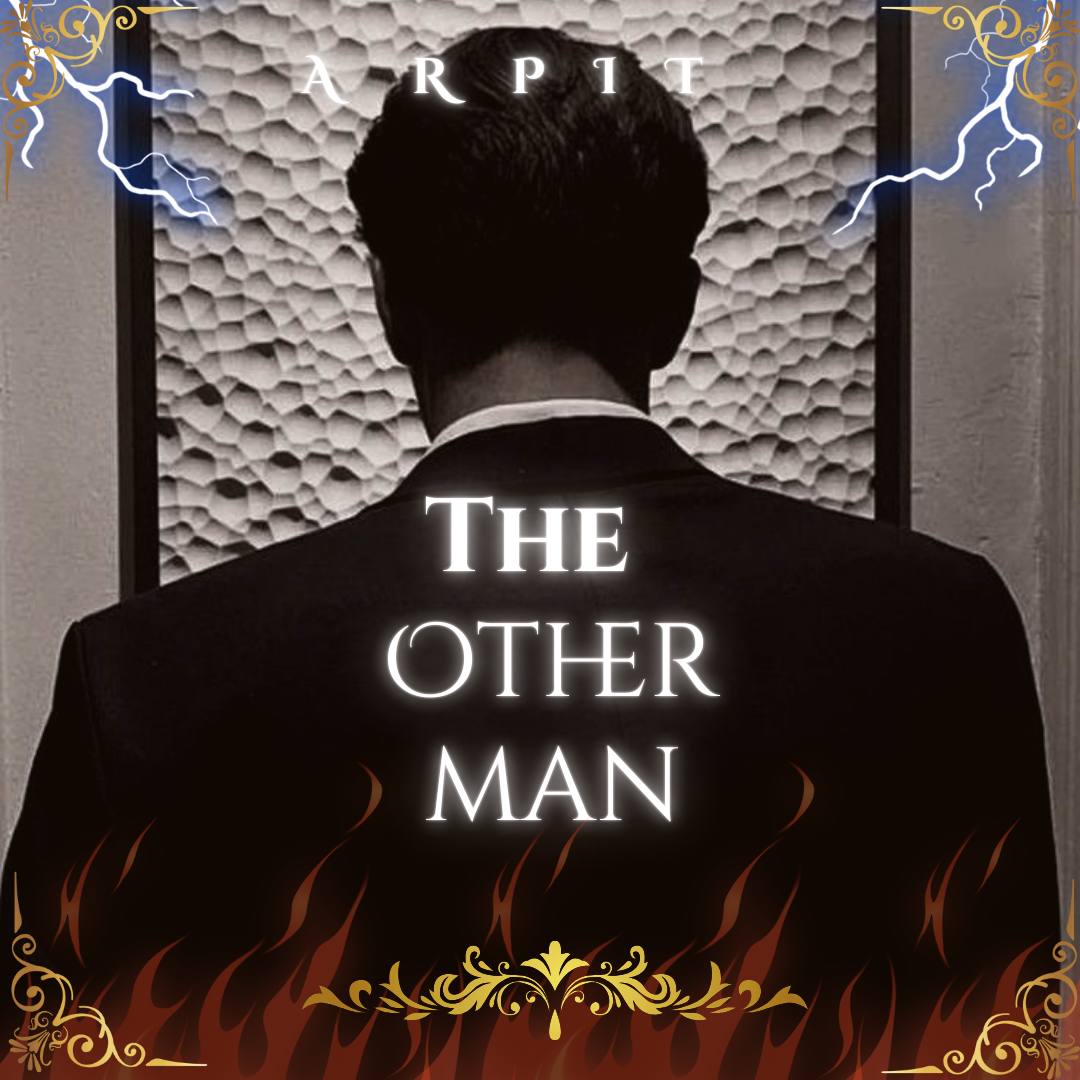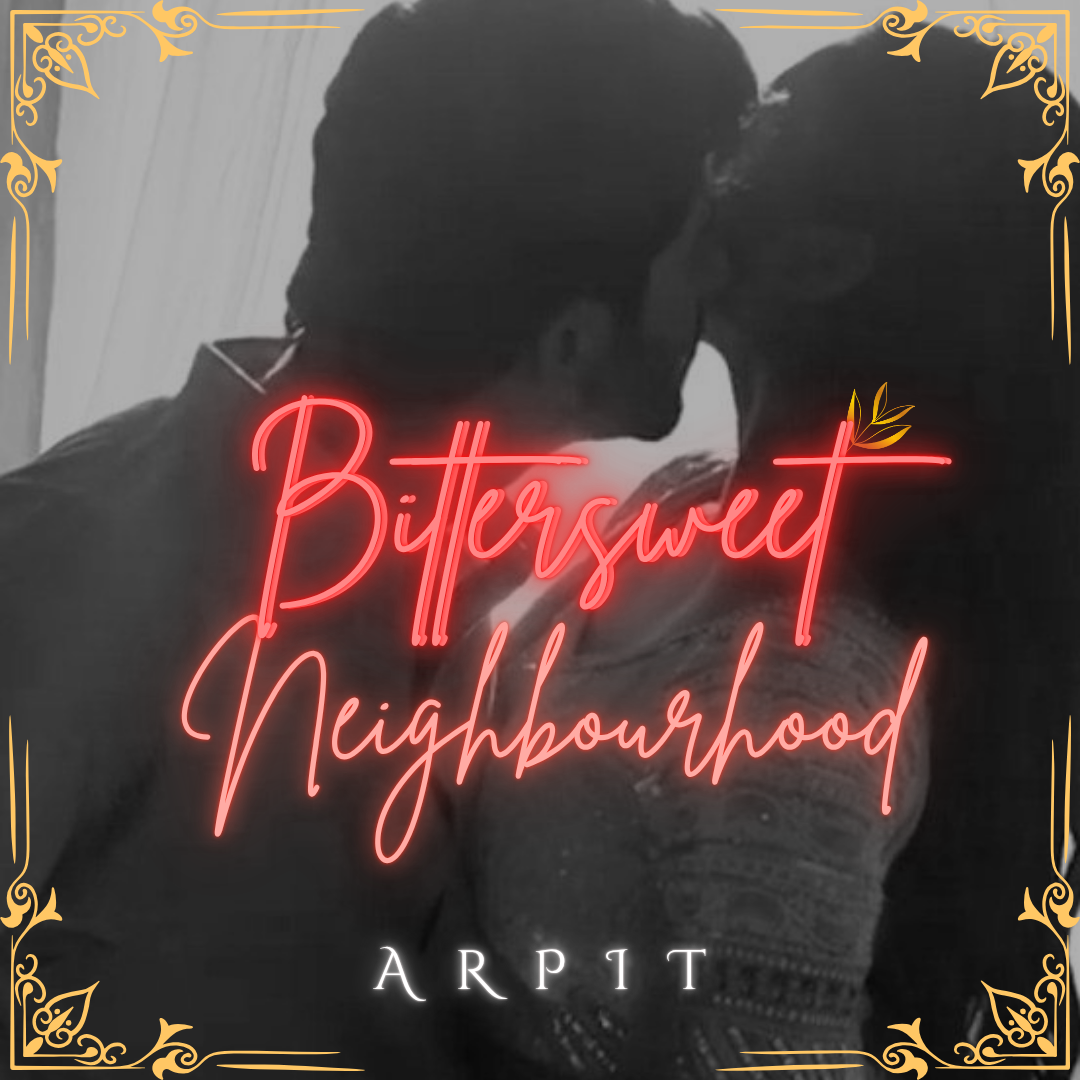

Later, next morning first thing at morning he saw the bag.
He didn't know her name.
Didn't know her house.
Only her eyes.
And the way she had fallen from the sky like a story he hadn’t asked for but couldn’t forget.
For now, he decided to keep the bag.
He would return it.
Somehow.
Later.
He wake up and decide to look after his work, which is why he came in this village.
At Haveli,
The kitchen of the haveli was hot—not just from the clay stove burning wood, but from the sharpness in the air. Smoke curled upward, mingling with tension.
Mugdha stood barefoot on the stone floor, her dupatta tucked tightly at the waist, rolling out dough on a wooden board. Her knuckles were dusted with flour, and her jaw was set.
A misshapen roti sizzled on the iron tawa, its edges uneven.
Kamini Devi hovered nearby like a hawk with a ladle.
She looked down at the roti.
Scoffed.
"Chori,Yeh roti hai? Ya Rajasthan ka naksha?"
("Girl,Is this a roti? Or the map of Rajasthan?")
Mugdha said nothing. Her hands moved in silence, shaping the next ball of dough.
"Kya karenge tumhare sasural waale? Kya yeh roti khaenge? Ya tumhe wapas bhej denge thali mein saja ke?"
("What will your in-laws do with this? Eat it, or send you back on a plate?")
Kusum stood in the corner, chopping coriander slowly. Her hands trembled, but her lips remained sealed.
Kamini didn’t stop.
"Bachpan se sar par chadha rakha hai is ladki ko. Na silai aati, na pakana, na bolna. Sirf chadhne ka shauk hai—pedon pe, sapno pe, sharam ki hadd ke upar."
("You’ve pampered this girl since childhood. Can’t stitch, can’t cook, can’t behave. All she knows is how to climb—trees, dreams, and beyond the line of shame.")
Still, Mugdha didn’t speak.
She placed another roti on the tawa. This one was no better.
Kamini sneered. "Aise roti banaogi toh sasural mein na roti milegi, na jagah."
("If you cook like this, you’ll get neither food nor place in your in-laws’ home.")
She turned abruptly, her thick silver anklets ringing like a judge's gavel.
Kusum opened her mouth to say something—anything.
“Jiji-”
(Sister in law-)
But Kamini raised one finger.
"Chup raho, Kusum. Ek baar tumhi ki baat maan ke galti ki thi. Ab dubara nahi karungi."
("Stay silent, Kusum. I made one mistake listening to you. I won't make another.")
With that, she swept out of the kitchen like a storm finally done destroying.
The only sounds left were the sizzle of the tawa and the faint rattle of a ladle.
Mugdha flipped the roti, now slightly burnt.
Kusum stepped forward. Quietly.
“Chal, bas kar. Main bana leti hoon. Tu jaa zara aangan mein baith.”
("Come, stop now. I’ll make the rest. You go sit in the courtyard.")
But Mugdha shook her head.
“Nahi, Ma. Mujhe seekhna hai.”
("No, Ma. I want to learn.")
And she rolled another ball of dough.
The sun had climbed high, blanketing the village in dry, buzzing heat. A sleepy breeze moved through the narrow lanes. The scent of boiling tea, warm dust, and roasting peanuts filled the air.
Akhand sat at the chai stall, resting on a wooden bench with a glass of strong, spiced chai in his hand. His jeans still had a smear of dried mud on the side, and his thoughts kept drifting—not to the land he was here to find, but to the girl who had fallen from the sky and left behind a bag with an embroidered M.
As he stirred his tea absentmindedly, he noticed a young boy—skinny, maybe 14 or 15—standing nearby, half-hidden behind a wooden pole, staring at him with wide, curious eyes.
Akhand tilted his head.
"Aye, kya dekh raha hai? Idhar aa."
("Hey, what are you looking at? Come here.")
The boy blinked, then stepped forward hesitantly. His shirt was too big for his frame, and his slippers flapped noisily as he walked.
"Naam kya hai?"
("What’s your name?")
"Rinku. Sab mujhe Rinku bulate hain."
("Rinku. Everyone calls me that.")
Akhand smiled slightly. "Toh Rinku, aise kya ghur raha tha?"
("So, Rinku, why were you staring like that?")
The boy scratched the back of his head, shy but excited.
"Suna hai…zameen dhoondh rahe ho?"
("I heard… you’re looking for some land?")
Akhand straightened, his interest piqued.
"Yes. My Nanaji had some land here, he gave the land on my mother’s name. I am here to find that land.”
Rinku lit up, proud to be useful.
"Toh aapko Manohar Bajwa se milna chahiye. Gaon ke sabse bade aadmi hain."
("Then you should meet Manohar Bajwa. He’s the most important man in the village.")
"Kaun hai yeh?"
("Who is he?")
"Zameen, registry, kabza… sab kuch unhi ke record mein hota hai. Unka ek haveli bhi hai—yahaan ke hisaab se sabse badi."
("Land, registry, ownership—everything goes through him. He even has a haveli—the biggest one in the village.")
From behind the stall, the chaiwala added without looking up,
"Sahi keh raha hai. Bajwa parivaar yahan ka sab kuch hai. Aur unka beta—Sahil Bajwa—woh logon ki madad karta hai land ke mamle mein. Paisa leke, lekin kaam karwa deta hai."
("He’s right. The Bajwa family runs everything here. And his son—Sahil Bajwa—he helps people sort out land issues. Charges money, but gets things done.")
Akhand nodded slowly, absorbing it.
“Ok if he can help me, then i will meet him.,” he muttered to himself.
"Shukriya, Rinku."
("Thank you, Rinku.")
The boy grinned proudly.
"Aur kuch chahiye ho toh mujhe poochhna. Main sab jaanta hoon yahaan."
("If you need anything else, just ask me. I know everything around here.")
Akhand chuckled.
"Haan, dikh raha hai."
("Yeah, I can see that.")
As Rinku disappeared into the crowd, Akhand finished the last sip of chai and looked toward the path leading to Bajwa Niwas.
Manohar Bajwa.
A name that could open doors.
Or secrets.
The clang of brass plates echoed softly in the open dining hall of the haveli, where the men of the house—Manohar Bajwa and Chandan, Mugdha’s Bade Papa and Papa—sat cross-legged on the floor in the traditional Indian style. A long wooden mat was spread across the cool stone floor, and the aroma of ghee, tadka dal, and freshly made rotis lingered in the air.
Kamini Devi, the matriarch, moved around briskly with a large steel bowl of dal, while Kusum, quieter and always two steps behind her, served the sabzi and rice. Mugdha, however, stayed tucked inside the kitchen doorway, clutching the edge of her dupatta, half-hidden behind the curtain, eyes nervously following every movement.
Manohar took a few bites of his food in silence.
Then suddenly, he paused. His hand stopped mid-air, fingers still holding a morsel of roti soaked in dal. He turned to Kamini, frowning.
“Yeh daal mein namak zyada hai. Khaana banana bhool gaye ho kya?”
("This dal is too salty. Have you all forgotten how to cook?")
Kamini flinched.
Kusum froze mid-step, holding a bowl of rice.
For a second, no one said a word.
Then Kamini cleared her throat quickly and forced a composed smile.
“Woh… Mugdha ne banaya hai aaj. Seekh rahi hai.”
("Actually… Mugdha made it today. She’s learning.")
Manohar wiped his mouth with a cloth, sighing in irritation.
“Theek hai. Seekh rahi hai toh theek hai, par khaana parosne se pehle taste toh kar lo. Kaun jaane khaane layak hai bhi ya nahi.”
("Alright. If she’s learning, fine. But at least taste the food before serving it. Who knows if it’s even edible.")
Chandan, who had been eating silently until now, placed his hand on his knee and spoke in his usual cold, clipped tone.
“Main baat karunga usse. Aisi galti dobara nahi honi chahiye.”
("I’ll speak to her. This kind of mistake shouldn’t happen again.")
From the kitchen, Mugdha heard everything.
And she trembled.
Not because of the salty dal—but because of that voice. Her father’s voice. Flat and dangerous.
She knew what "baat karunga" meant.
It meant her father would yell again.
Threaten again.
And maybe tonight… her mother would cry again.
She pressed her back against the cool wall, her hands tightly gripping the folds of her dupatta to stop them from shaking. She didn’t cry. She was used to it.
But a tiny part of her—buried deep under the fear—ached.
On the way to the Haveli
Akhand walked along the dusty path leading toward the grand haveli. The midday sun hung heavy in the sky, casting sharp shadows beneath the neem trees lining the lane. As he passed by a small cluster of women and girls gathered near a well, he noticed something that made him pause—then quietly observe.
A few teenage girls, their faces veiled with light scarves, quickly turned their heads away as he came closer, as if shielding themselves from his gaze.
Nearby, a little girl, no more than seven or eight, was walking with her mother. The child’s eyes peeked curiously at the stranger, but suddenly her mother gently—but firmly—pulled a thin shawl over her daughter’s face.
“Beta, bahar ke mardon ke samne chehra mat dikhaana. Achha nahi lagta.”
("Child, don’t show your face in front of outside men. It’s not proper.")
Akhand’s eyes flicked up at the mother, unsure if the warning was meant for him—or for the other men standing quietly nearby, watching.
He wasn’t sure. But it didn’t feel warm.
The weight of cautious eyes and covered faces felt like a wall closing in.
He kept walking.
The village looked beautiful, but Akhand felt like a stranger in a place where even the smallest glances were guarded.
Inside the Haveli
The afternoon light filtered weakly through the heavy curtains of the haveli’s drawing room. The air was thick with the scent of incense and simmering spices from the kitchen, but a heavier, more suffocating tension hung between the walls.
Chandan’s footsteps echoed sharply on the marble floor as he approached Kusum, who was sitting nervously on a low wooden stool near the window, her hands folded tightly in her lap.
With a voice that brooked no argument, he commanded,
“Kusum, Mughda ko yahan bulao.”
("Kusum, call Mugdha here.")
Kusum looked up, her eyes pleading,
“Woh toh bacchi hai,. Use chhodo na. Usne jaan bujhkar koi galti nahi ki.”
("She’s just a child.. Leave her be. She didn’t make any mistake on purpose.")
But Chandan’s tone hardened, his patience wearing thin.
“Jo maine kaha, woh karo! Abhi.”
("Do as I say! Now.")
Kusum swallowed her fears and left the room. Moments later, Mugdha appeared in the doorway, her small frame silhouetted against the bright kitchen light behind her. Her eyes were red-rimmed, and her usual spark was dimmed by the heavy burden she carried.
She stepped in softly and said,
“Bapu sa Mujhe samajh nahi aata ki maine galti kahan ki, lekin agli baar main poora dhyan rakhungi.”
("Bapu sa I don’t understand where I went wrong, but next time I will be careful.")
Chandan’s eyes narrowed, his temper flaring like dry leaves catching fire. Without a word, his hand shot out and gripped a delicate vase sitting on the table. With a violent flick, he sent it crashing against the wall. The shattering sound pierced the room like a gunshot.
Kusum gasped, clutching her chest, and Mugdha instinctively took a step back, her heart hammering painfully in her chest. Her lips trembled, and tears pricked the corners of her eyes.
Chandan’s voice thundered.
“Tum achhi tarah pakana kyun nahi shikti? Tum ladki ho, tumhe yeh sab aana chahiye! Tumhara farz hai ki ghar mein sab kuch sahi chale.”
("Why can’t you cook properly? You’re a girl, you should know all this! It’s your duty to keep everything right at home.")
He turned sharply towards Kusum, his face darkening with anger.
“Agar aisi galti dobara hui, toh tumhe iska daam chukana padega. Samjhi?”
("If this mistake happens again, you’ll have to pay for it. Understand?")
Kusum said nothing, but her hands shook, and her eyes filled with silent sorrow.
Without another word, Chandan stormed out of the room, his footsteps echoing down the corridor, leaving behind a heavy silence.
Mugdha stood frozen, her body trembling like a fragile leaf in the wind. She pressed her palms against her ear to steady herself, but inside, a storm of fear and doubt swirled.
Her thoughts churned, cold and relentless,
“Mere pati kaisa honge? Kya woh bhi mujh par chillaayega, mujhe maarayga?”
("What will my husband be like? Will he shout at me too? Will he hurt me?")
The weight of the question crushed her chest, but no answer came.
Akhand reached the grand gates of the haveli just as the afternoon sun cast long shadows across the courtyard. Two burly guards stood by the large wooden doors, their faces stern and unreadable.
He stepped forward and spoke calmly,
“Excuse me, Manohar Bajwa ji ghar pe hain kya?”
("Excuse me, is Manohar Bajwa at home?")
One guard squinted at him and replied in a thick Rajasthani accent,
“Bhai sa, thari andar ghuswaat ko nahi.”
("Brother, you won’t be allowed inside.")
Akhand’s tone softened but stayed firm,
“Mujhe unse zaroori baat karni hai. ”
("I have an urgent matter to discuss with him ")
The other guard stepped forward, rubbing his chin, and said with a drawl,
“Yo haveli hai, bhaisaab. Sab baat mann ne nahi aave. Tham roko jaye.”
("This is a haveli, sir. Not everyone is allowed. You need to wait.")
Akhand sighed but tried again,
"Please, let me meet Manohar Bajwa. It’s very important."
The first guard folded his arms and answered flatly,
“Maaf karna sa, thare jaise logan ne andar jaane ki ijazat kadhai nahi.”
("Sorry, people like you aren’t permitted inside.")
Akhand looked up at the massive haveli, frustration flickering across his face. He realized he’d have to find another way to get in — or someone else to help him.
Sneak peek- Chapter 9
“Arre Saheri babu, kaam ho jaaye pehle, phir paisa dena. Abhi ke liye paanch lakh hi kaafi hai.”
("Hey city gentleman, let the work get done first, then give the money. For now, five lakh will be enough.")
Akhand nodded again, pulling out a cheque and handing it over.










Write a comment ...